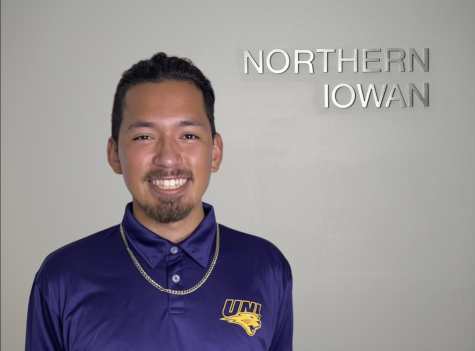UNI alum and advocate speaks with BSU
Oct 4, 2021
On Friday, Oct. 1, students from all around campus came together in celebration of the 50 year anniversary of the Black Student Union (BSU). The BSU, according to the historical archives, “serve the purpose of enhancing knowledge as people and promoting the spirit of unity, consciousness, history and diversity among students, faculty, staff and the community.”
President of BSU Laito Zarkpah says they have been involved in the university and “will continue to celebrate 50 years more.”
During the celebration Terry Stevens, a member of the UNI 7, spoke on the importance of BSU and the power of art. The UNI 7 included 22 students involved in a peaceful sit-in protest at former UNI President Maucker’s house in 1970. They demanded inclusivity around campus. The protest resulted in seven students’ arrests and their suspension.
“So how can we use the arts to address issues of hatred, violence and destruction of communities? Think about that,” Stevens said. “Political and social justice are much to the art because the arts provide a safe vehicle for discussion, for understanding and for educating.”
Stevens continued by addressing different types of activism. “Activism is sometimes confrontational, sometimes informative, sometimes silent. I choose not to be confrontational. But I have skills to do so if I need to. I like to be informative. I like to inform people about things that they may not know about so that they can bring in a new perspective in their lives, trying to figure out a new way to do something.”
She continued, “People who work to make changes for what they consider the betterment of their community are called an actor’s traits of an activist leadership qualities, effective communication skills, dedication to the cause and the ability to convince others to believe in and fight for that cause.”
Stevens’ speech engaged many audience members in conversation. One audience member participated in defining the acronym “THUG LIFE.”
THUG LIFE originated from the rapper Tupac Shakur. “Thug” references those who overcome obstacles and barriers.
Stevens identified that Black Americans have dealt with “mass lynchings, gerrymandering, the Tuskegee syphilis, experiment, barriers to education, segregation, interior resources, racial violence, Tulsa and Black Wall Street – including sundown town, where if you were in town, and you were Black, if you didn’t get out of there before it got dark, you could be killed.”
Later in her speech, Stevens mentioned the importance of American history.
“If I have to study American history, and then I have to study world history somewhere, often there should be my history and it should be mandatory; all history should be mandatory,” Stevens said.
Throughout her speech, Stevens spoke upon the term advocacy and what it means.
“An advocate is one who defends or maintains a cause of one or two (people) who supports or promotes the interests of a cause or group. Advocacy is about helping someone else find their voice,” Stevens said.
Stevens circled back to the importance of continuing to be an advocate in the community, and encouraged others to do the same.













